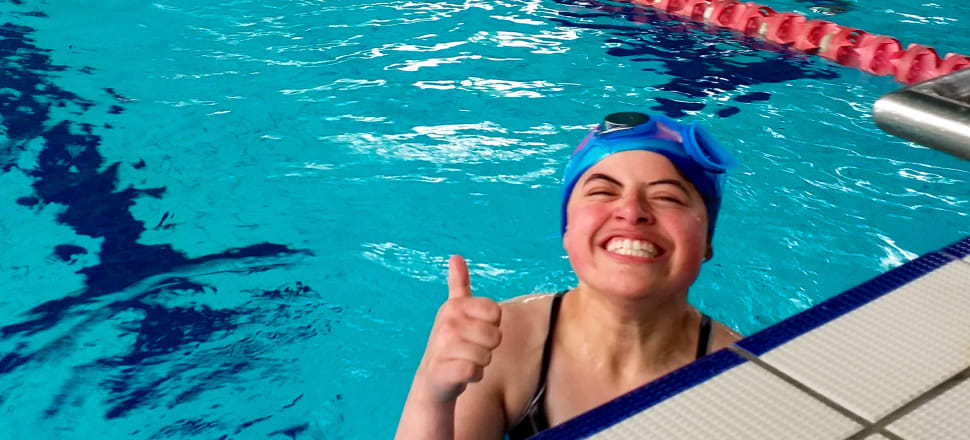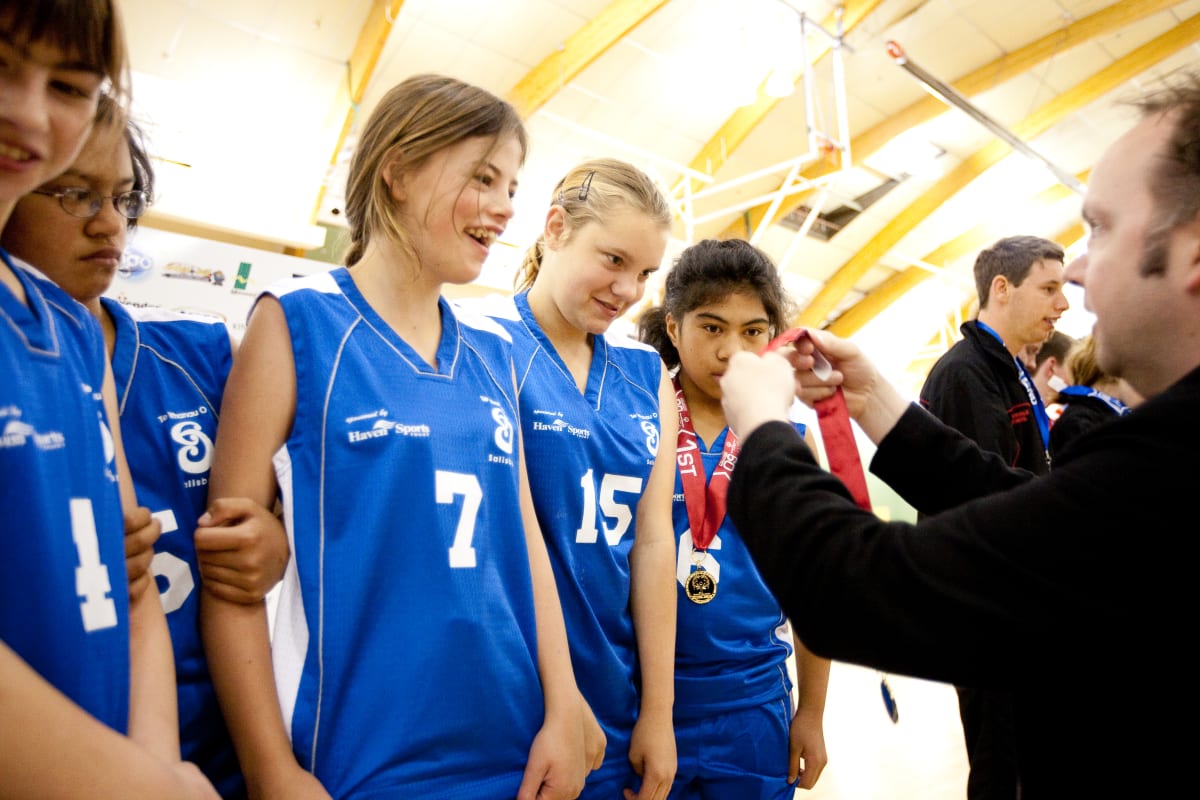
An Olympic rowing medallist will be poolside supporting her big sister at this week's Special Olympics Summer Games, where there's a big push to get more female athletes competing, Merryn Anderson reports.
Carolyn Young remembers a swimming race where an athlete suddenly stopped in the middle of the pool, slightly thrown off by a change in depth - and all the other swimmers stopped with them.
“They all wanted to make sure the other person was okay…and once they decided they were okay, they carried on,” recalls Young, CEO of Special Olympics New Zealand.
“What great sportsmanship people show to make sure their friend and competitor next to them, who'd stopped because they got anxious, was okay. That is the joy of the Special Olympics.”
For many of the 1500 athletes competing in the Special Olympics National Summer Games in Hamilton this week, it will be their first time spending multiple days away from home. And that's as big a deal as competing.
But Melissa Donoghue couldn’t be closer to home. In fact, the Waikato-based swimmer works as an instructor at Waterworld in Hamilton, where she'll be competing in four pool events at the National Summer Games.
“I’ve always liked swimming, so it’s great to get that job,” says Donoghue, who has Seckel syndrome, a form of primordial dwarfism she says is pretty rare.
READ MORE: * Donoghue and Osborne win NZ's second Olympic medal * Hero in blue tutu leads way for kids with disabilities
She'll also have an impressive support crew behind her - an Olympic medallist among them. Her younger sister, Olympic rower Brooke Donoghue, who won silver at last year's Tokyo Olympics (and recently became a mum), will be cheering Melissa on - along with their parents, Leo and Leanne, from the small settlement of Waiterimu, near Te Kauwhata.
“As long as I can remember, I’ve been going along to swimming competitions, while Melissa has been coming to my regattas,” Brooke, a two-time world champion, says.
The sisters have their own collections of world championship medals, with Melissa winning two silvers and a bronze at the 2019 World Games in Abu Dhabi. But there's something exciting, Melissa reckons, about getting to compete at home.

She's been swimming since 2007, and competes in Para swimming as well - often in the same classification as multiple Paralympic champion Dame Sophie Pascoe.
At these Games, she's racing in the 50m butterfly, 400m freestyle, the 200m individual medley and the medley relay. Her favourite thing about the Special Olympics is “meeting new and old friends.”
Due to a global trend of diagnoses for intellectual disabilities being more common for males, there are generally fewer women competing in the Special Olympics.
But some clubs are actively trying to encourage more women and girls to take up a sport, like the Papakura Special Olympics Club, who this year have achieved a 50:50 gender split in their membership.
There are plenty of female role models, too, like Special Olympics athlete leader Grace Payne, who's been recognised for her tireless advocacy work for people with intellectual disabilities at the 2022 Global Youth Summit.
The 23-year-old from Waiuku, born with autism, was chosen from five million athletes around the world to be the inaugural recipient of the Ray and Stephanie Lane Award for Inclusive Youth Leadership.
“Inclusion means that everyone is being involved and included,” says Payne, who was fourth in basketball at the 2019 World Summer Games, and will be competing in powerlifting at these Games. “Nobody should be left out or be unheard. Instead they should be given equal opportunities.”
Young says the National Summer Games, featuring 10 sports, is a huge opportunity for Kiwi athletes with intellectual disabilities. “It’s a massive thing for us to ensure they have those opportunities to explore the journey of catching up with new and old friends and competing and having fun,” she explains.
“All of those things are really important because they’re not getting those opportunities often elsewhere.”
Young started working at Special Olympics in 2018, coming from a background at Netball Central, and says her favourite thing about her job is seeing the joy on the athletes’ faces. “The key thing with the Special Olympics is the sportsmanship and the smiles you see from everyone, everyone’s having a good time.”
Every competitor will get a medal, and rather than races being categorised by the athletes’ disability, they compete with people of similar abilities.

A sense of connection is one of the most important aspects of the Games, Young says.
“Special Olympics offers that opportunity when they go to training every week to connect with other people who are similar to themselves, where they’re accepted, where they have fun and keep fit and have a sense of purpose to their day,” she says. “It’s part of that broader fulfilment of having a valued life and enjoying each day.”
Swimming is one of the most popular sports at the Special Olympics, along with basketball and tenpin bowling.
“Families want people to be able to swim safe so that’s probably a starting point on why people learn to swim. It's also good for them, it’s low impact,” Young explains.
“Basketball is the most rapidly growing sport in New Zealand, it’s very popular. And tenpin bowling is a sport that's not as athletically physical in terms of the aerobic requirements, but you need to be balanced and have good arms."
Special Olympics events are contested over four levels - local, regional, national and international.
Typically, the National Summer Games are used as a qualification for the World Games, but with the Hamilton event having been delayed a year by the Covid pandemic, entries for the world tournament had to be registered before the national event could take place.
“Because the international competitions are mostly in the Northern Hemisphere, we go away for 18-20 days,” Young explains. “The big thing about that is being able to cope with travel for 30-35 hours and being away from home for three weeks.”

Competing at nationals means being away from home for six days. “It’s as much about how people can cope and be independent as it is about their athletic performance,” says Young.
“There’s more than a thousand other athletes, 300 other coaches, 600 volunteers, lots of spectators, lots of noise and activity and staying in places you’re not familiar with, eating in different ways, all of those sorts of things. So that’s as much a part of the journey as the training and the competition and winning the medals."
Young encourages people to come along to watch or volunteer at the Games.
“People with an intellectual disability are just people and they want to have the opportunities that everyone else has,” she says.
“It’s a really fun environment and it would be really great to see more people come along and get involved.”
*The Hamilton Special Olympics National Summer Games take place from December 8-12. Volunteers are still needed for the weekend - email volunteers@specialolympics.org.nz to help.







